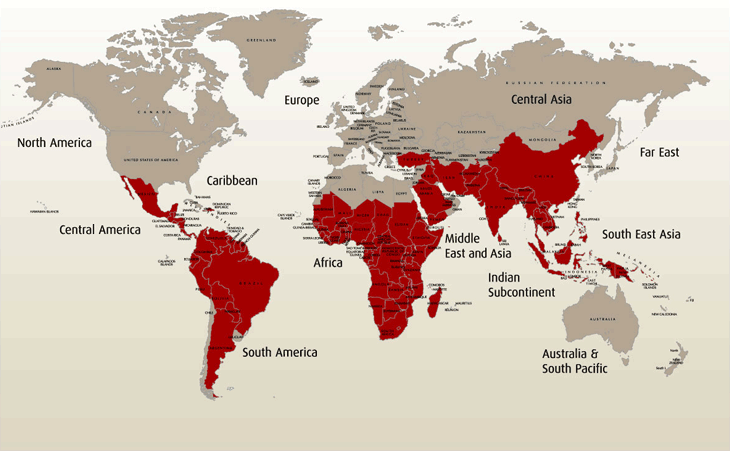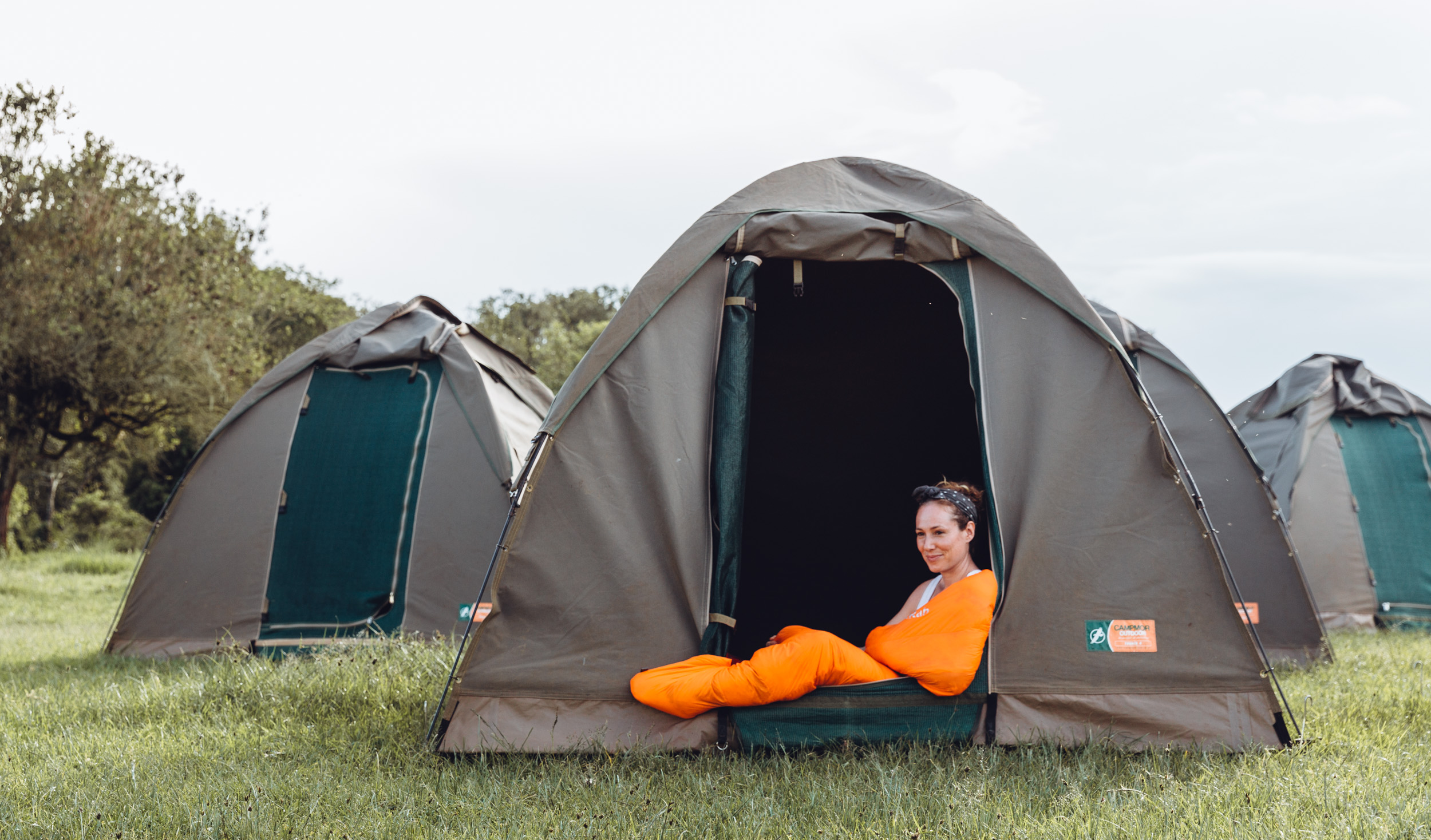As soon as you leave the shores of the UK, there are an ever increasing number of things that want to bite you. Thus far - a mere four months into our two year trip - we have encountered bed bugs, sand flies, ants, the odd bat, a number of particularly veracious street dogs, snakes and, of course, mosquitos.
Mosquitos, these small and frustrating creatures, are the bane of every traveller's existence.
They are the reason that come dusk we douse ourselves in DEET which, despite a a proven safety record, has been seen to melt car dashboards and innumerable plastic containers. They are responsible for turning the most baby-soft skin into a mass of hives and welts that do nothing to flatter your newly acquired bronze hue and make a night under the stars a battle of wills and itching limbs. However, it is the darker side of these tropical nasties that cause me the greatest concern; a single bite from an infected mosquito can kill.
207 million | recorded cases of malaria in 2012
600,000 | deaths from malaria in 2012
60 seconds | an infant dies from malaria every minute
1,245 | cases of UK residents diagnosed with malaria*
7 | deaths from malaria in UK*
81% | of those diagnosed UK cases did not take anti-malarials*
In light of these shocking statistics (*UK figures from 2013) and as a registered doctor, it has concerned me that malaria, and the risk it poses to travellers, is perhaps misunderstood by many. Overheard conversations in hostels and on public transport have revealed to me that there are a myriad of myths and misunderstanding surrounding the disease and the need to protect ourselves:
“I read that you can become immune to malaria so I'm not going to take anti-malarials. Then I'll never need them.”
“The tablets were taking up too much space in my backpack, so I took them out."
“It's a virus like the cold and I never get sick with a cold.”
“People don't take doxycycline to prevent malaria; it's to stop them getting coughs and colds”
“I didn't take it last time and I didn't get malaria, so why bother this time.”
“Malaria's only really in Africa isn't it?”
“I took Larium once and had a really bad dream, so now I won't take any of them.”
“Are you taking anti-malarials?” “Well, I got my injections...”
"It's not good for you to take medication for so long"
"I couldn't afford them."
Having been through the mental assault course of travel preparation ourselves, here is a little information to help you better understand the risks and the realities before your next adventure (answers to the above myths are at the end of the article.)
so, what is malaria?
Malaria occurs as a result of a bite from an infected Anopheles mosquito, a mosquito infected with Plasmodium parasites. Worldwide there are four main types of parasite, Plasmodium vivax and Plasmodium falciparum being the most common. The latter is also the most lethal, frequently leading to severe illness and sometimes death within 24 hours if no treatment is sought.
Following a bite, the parasites enter the person's bloodstream and quickly migrate to the liver, where they rapidly multiply before re-entering circulation to invade the red blood cells.
There, they continue to multiply until the cells burst, releasing large numbers of parasites back into the blood. It is the sudden release of vast numbers of parasites that causes the classic high fevers associated with malaria.
what are the symptoms?
Symptoms of the disease usually appear one - two weeks after infection and can often be relatively mild at the beginning. Common complaints are fever, headache, chills, body aches and pains and vomiting, although I have encountered people complaining of anything from abdominal pain to confusion.
Most worrying, and often least appreciated, is that a person infected with malaria can relapse months or even years after the first episode. It is therefore important if you have ever been to an area with a known risk of malaria, and you become unwell, that you tell your doctor so they can consider malaria as a diagnosis.
how can I prevent it?
Although there is no 100% money-back guarantee, there are a number of things that you can do to significantly reduce your chances of contracting this deadly disease:
01. use an insect repellant
DEET is an adventure traveller's best friend, but for those with an aversion to nasty chemicals, there are multiple natural alternatives that are often just as effective. We have used both Incognito and SMIDGE, which are both DEET free.
02. use a mosquito net
If you plan on spending nights under the stars, gently swinging in a hammock listening to the ocean, a single person mosquito net is an essential purchase.
03. long-sleeved, loose clothing
Although high humidity in and around the wet season may leave you with an unrelenting desire to walk around wearing nothing but your birthday suit, come dusk, long-sleeved tops and trousers will make it a little more difficult for the mozzies to make you their dinner.
There are also a number of clothing lines on the market that manufacture items of clothing impregnated with insecticide.
04. anti-malarials
Knowing which anti-malarials to take can be tricky, especially if you are planning a long trip that involves traversing multiple malaria hot spots. To complicate matters further, due to increasing chloroquine resistance, a drug that works in one country may be next to useless in the next.
Thankfully, this is why travel clinics exist! I cannot recommend strongly enough how important it is to have an early appointment booked to discuss your options and ensure you can obtain the appropriate medication in time.
For the sake of our readers sanity and due to the scope of our trip, I have restricted the third-party overview of anti-malarial medications in the below table to those pertaining to Latin America.
A full review of appropriate prophylaxis (medication taken to reduce chances of contracting a particular disease) covering the globe is a complex and lengthy topic so, if you are travelling outside of Latin America, be sure to follow the links at the bottom of the page for country specific information and consult your travel clinic.
Information from traveldoctor.co.uk
but what about side-effects?
Side-effects of medications are an oft cited reason for not completing courses or avoiding anti-malarials entirely, and whilst a small percentage of people may experience adverse effects, the vast majority are absolutely fine.
The most common side-effects are:
Chloroquine - nausea, temporary blurred vision and rashes.
Proguanil - nausea and simple mouth ulcers.
Doxycycline - photosensitivity (increased incidence of sunburn is experienced by approx 3% of people and a an itchy rash following short exposure to the sun), heartburn (can be easily avoided by taking with food and avoiding lying down for two hours) and thrush.
Larium (mefloquine) - dizziness, headache, sleep disturbance, hallucinations and anxiety. Larium is to be avoided in those with a history of mental illness.
Malarone - this new medication has no significantly notable side-effects.
Confused or worried about travel insurance? Read our guide to make things simple
how do I get my anti-malarials?
The initial port of call should be a reputable travel clinic, and a quick internet search on those in your area should yield a number of options, particularly in larger cities. Here, you will find nurses specifically trained in travel medicine who will run through your itinerary, any pre-existing medical conditions and discuss your options.
Providing you give them with as much information as possible, and with enough time to spare before jetting off, they will be able to deliver bespoke advice on your required vaccinations and anti-malarial tablets.
With each drug, it is important you are fully aware of the frequency of dose and duration of the course. With all, you will have to start your regime prior to your trip and continue it after you come home for a specific period of time; adhering to this schedule once home is as important as whilst on your adventure.
This can be particularly confusing if you are changing drug regimes as you travel from one endemic region to another. Be certain to follow your prescription to the T.
what if I become unwell?
If you develop a fever within one week of arriving in an endemic area, or up to two years after you leave, you MUST seek medical advice. Although the milder symptoms are akin to a number of viral or parasitic illnesses, if you have contracted P. falciparum and fail to recognise the symptoms or seek treatment, it may be the difference between life and death. This particularly aggressive sub-type can lead to the failure of multiple bodily functions - your kidneys could fail, leaving you requiring dialysis; your blood can fail to clot resulting in bleeding from your mouth and eyes, and in your faeces and urine; and you may even develop seizures or slip into a coma.
In most cases, where medical intervention is sought early, malaria can be treated. However, don't forget that prevention is always better than cure, and that in taking medical advice and precautions you increase your chances of avoiding a horrible illness with dire consequences.
common malaria myths busted
“I read that you can become immune to malaria so I'm not going to take anti-malarials. Then I'll never need them.”
Whilst it is certainly true that adults who have spent their entire lives in endemic regions have a degree of immunity, young children and those brought up in the foothills of North Wales certainly have none.
If you move to Malawi and manage to survive several nasty bouts of malaria you may fare better than the first time, but it's not a method I'd recommend.
“The tablets were taking up too much space in my backpack, so I took them out."
I understand. We have a two years supply of anti-malarials with us (one of which is doxycycline and equates to four tablets/day between us!) but no matter what the fancy advertising leads you to believe, those sexy sandals or another strapless bikini will not save your life! The tablets are an essential piece of kit.
“It's a virus, like the cold, and I never get sick with a cold.”
We heard this twice. Whilst I don't expect everyone to have an intimate knowledge of malaria, you should at least do some homework (or pay a lovely travel nurse to explain the basics). To have no appreciation of the medical dangers associated with international travel is tantamount to jumping out of plane without a parachute.
“People don't take doxycycline to prevent malaria, it's to stop them getting coughs and colds.”
Whilst is is certainly true that doxycycline is a type of antibiotic, at the doses required for malaria prophylaxis it will provide no assistance should you contract a bacterial infection.
Furthermore, it provides no protection against coughs and colds, as these are usually viral.
“I didn't take it last time and I didn't get malaria, so why bother this time.”
If visiting an endemic region, your chances of contracting malaria increase the longer you spend there.
If you visited Thailand on a two-week holiday, you may well have avoided becoming unwell, but if you then backpack around Africa for two years without prophylaxis on the basis that you escaped infection before, you risk exposing yourself to a disease that kills hundreds of thousands a year.
“Malaria's only really in Africa isn't it?”
Malaria is currently a problem in more than 100 countries. Although a large percentage of reported new cases are in Africa, large swathes of Asia and South and Central America are also affected.
Worryingly, the most common parasite in the Americas (P.vivax) can cause multiple relapses in the future - not the type of souvenir most of us want to bring home!
“I took Larium once and had a really bad dream, so now I won't take any of them.”
As previously mentioned, the side-effects associated with anti-malarials are often mild and easily manageable; Larium however has a number of adverse effects that can be understandably upsetting. It is however, worth noting that the bad dreams that can be associated with this drug, often improve over time, so it may be worth persevering.
I cannot stress how important it is to advise the medical professional responsible for your malaria prescription with a full medical history (especially mental health issues) and any previous negative experiences with malaria prophylaxis. If one drug isn't suitable for you, another will be.
“Are you taking anti-malarials?” “Well, I got my injections...”
Most people wouldn't dream of travelling to exotic countries without having at least a couple of needles poked in their arm. Whilst these are an essential part of your travel preparation, they should not be the only medical consideration you have before travelling.
When visiting the travel clinic, be sure to discuss anti-malarial prophylaxis in addition to vaccinations.
Although the yellow fever vaccine may cost a lot, and stump the mozzies attempts at this particular viral illness, it provides no protection against malaria.
"It's not good for you to take medication for so long."
In my job, I encountered many patients taking so many tablets daily that they would joke they must rattle when they walk, so I understand why young healthy travellers my feel uncomfortable about taking regular medication for prolonged periods of time, especially if it is an anti-malarial regime that requires frequent doses.
Although there are certain prophylactic medications that are not advisable for more than six months, there is always an alternative option if you are taking an extended trip. Just be certain to inform your travel nurse of the maximum duration of your trip (an be honest if you think you might end up staying longer than planned).
Similarly, remember that as soon as you stop taking your medications, you lose your protection against malaria, even if you have been taking them for two years!
"I couldn't afford them."
When planning a trip, the costs can certainly rack up. Instead of putting your savings towards finding the perfect bikini or upgrading your camera, your health should be the number one spending priority.
Certainly, the costs of the newer anti-malarials such as Malarone can mount up if travelling for more than a couple of weeks, but those that have been around for years - such as doxycycline and chloroquine - can work out surprisingly cheap, despite not being available as an NHS prescription.
Lastly, in the fine print of some travel insurance policies, you'll discover that failure to take appropriate prophylactic medication will render your medical costs cover nul and void should you require treatment for malaria (check out our guide explaining the common mistakes people make when buying travel insurance).
So, when working out your budget, be sure to factor this in.
final reminders
Malaria can, and does, kill travellers.
Prevention and preparation is key - buy a good natural repellent spray such as SMIDGE or Incognito.
Visit a travel clinic well in advance of your departure with a clear outline of your itinerary.
Budget for anti-malarials - they are an essential.
If you develop cold or flu like symptoms within two weeks of leaving, and two years of returning, seek a medical opinion.
And if you're still not convinced about the dangers of not taking the right medication on your trip, then read this harrowing account of a British woman's experience.
Useful Links
Disclaimer: Whilst I am a registered medical practitioner in the UK, I am not an infectious disease expert. This article is not designed to and does not provide medical advice, professional diagnosis, opinion, treatment or services to you or to any other individual. Through this article, alongdustyroads.com provides general information for educational purposes only. The information provided in this article, or through linkages to other sites, is not a substitute for medical or professional care, and you should not use the information in place of a visit, call consultation or the advice of your doctor/travel nurse or other healthcare provider. alongdustyroads.com is not liable or responsible for any advice, course of treatment, diagnosis or any other information, services or product you obtain through this article.





















